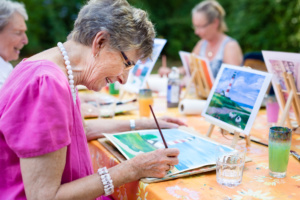The Healthy Power of Friendship
Why social connection might be the key to longevity
Article By Marilyn Kennedy Melia, CTW Features
No doubt you’ve heard some version of this question before:
Will you have enough for all the fulfillment and fun you hope to enjoy through your fifties, sixties, seventies, and beyond?
This time, though, the answer isn’t about whether you have enough retirement savings, but instead focuses on what researchers find is equally crucial to well-being: Friends.
A host of research finds that when we have a strong social network, emotional and even physical health improves.
An AARP Public Policy Institute report, for instance, finds socially isolated Medicare holders cost roughly $130 per month in health spending. And a recent Michigan State University study finds that friends are a better predictor of health and happiness than family ties as we age.
How can others make such a wide impact? Well, explains William Rawlins, Stocker Professor of Interpersonal Communications, Ohio University: “We are human beings, and we’re made to care about, enjoy, and engage with other human beings.”
But just as building retirement savings requires your time and attention, nurturing satisfying social connections does as well.
Stitching Together New Networks
When we’re younger, social interactions are plentiful: first in school and the neighborhood, then in the workplace, and – for those who are parents – connections through their children.
But those “ready-made” connections are vulnerable for those fifty-plus since circumstances arise that can abruptly break social circles.
Retirement is the obvious disrupter: dozens of work relationships can end when you close the office door for the last time.
Perhaps the greatest isolator, however, notes Jialu Streeter, a researcher at the Stanford Center on Longevity, is a long stint of demanding caregiving.
“I had very little social contact through the six years I spent caring for my father-in-law,” relates Avis Brown, resident of Morgan Hill, California, who continually commuted to the East Coast for caregiving.
“It is amazing when you are immersed in caregiving for that number of years,” Brown explains, “your brain shuts down in other areas. My friends were supportive but I wasn’t reaching out to them.”
In the years since her father-in-law’s death, however, Brown has reactivated old friendships, and with her now-retired husband, Dave, they’ve forged new ones.
Indeed, the years re-shape social networks, but they are often more satisfying than ever.
“Older people have a strong desire to seek meaning in life,” Streeter explains, “and thus they are more likely to move away – or completely drop – connections [that] are not important to them.”
Take a look at some situations that can break connections, but can also provide an opportunity to keep and forge more meaningful ones:
- Looking at retirement.
One of the key questions that Sara Zeff Geber, Ph.D., owner of LifeEncore, a retirement consulting service, asks her clients is: “What percentage of your social connections are work-related, and what percentage are based on other connections?”
Geber says that answers, “vary from one end of the spectrum to the other.”
“For those who are still tied socially to work [colleagues], I suggest starting to shift that by reacquainting themselves with old friends who may have fallen off their radar, neighbors they never really met, and people from their place of worship.”
“Gyms are sometimes good places to form social connections,” she adds. “It just takes opening your mouth instead of keeping your head down and attending to business.”
Brown, a former salesperson who readily admits, “shy is not a term that applies to me,” relates that she struck up a conversation with a neighbor who she never had time to get to know previously.
Now that Brown, her husband, and their neighbor are all retired, “we get together with them three or four times a year.”
Striking up a conversation isn’t easy for the shy, however. Start small – literally, Rawlins suggests. “Just say hello and make small talk,” he explains. As time goes on, friendships may develop.
But, Rawlins underscores, casual connections are also crucial to well-being. “We all need acknowledgment; a simple ‘How are you doing?’”
Once workplace ties are gone, replace that type of structured socializing with similar ones, Rawlins suggests.
Volunteer and join groups that revolve around your interests, whether it’s the garden club or exercise class, and you’ll make casual contacts that may grow.
- Relocating to a new area.
Snowbirds, those who move to be closer to children or grandchildren, and others who make a long-distance move for any reason, would seem to be especially vulnerable to isolation.
But just the opposite can be true. Many communities, says Janis Hennessy, president of the New Canaan Board of Realtors, Connecticut, have a “Newcomers Club,” and various civic organizations and church groups that will welcome you.
Moreover, libraries have also evolved from just book-lined shelves where you’re not supposed to speak above a whisper, adds Hennessy, to offering seminars, workshops, and classes where you can chat with others.
Lori Day, an educational consultant who relocated to Newburyport, Massachusetts eight years ago remembers thinking, “Now that I’m an older, self-employed, empty-nester in a new town, finding friendship is an utterly deliberate act.”
It was also a trial-and-error process.
“I joined a nonprofit board that was a poor fit for me,” she remembers.
But later, as she learned more about her new hometown, she found a nonprofit that was such a perfect fit, that she is now the board president.
A good method for exploring who in town you might want to connect with is to explore “online groups to find out about community events,” says Melanie Green, associate professor of communication at State University of New York at Buffalo.
- Staying here and missing you.
We’re a mobile society, and it’s likely that some friends will move a distance away.
Now, more than ever, technology renders geography irrelevant. But there are technological techniques that are better substitutes for in-person contact than others.
“Active engagement matters,” Green explains. “Seeing a long-distance friend’s pictures on Facebook is nice, but making the small extra effort to comment on the friend’s posts more closely mimics in-person contact”, Green notes.
“Individuals tend to be happier and more connected on social media if they are interacting with others,” she says. “Sometimes passive use – just browsing – can actually be negative, because people might feel like everyone else is having an exciting life while they are just home in front of the computer.”
Keeping in touch with old friends is a benefit. Still, many retirees will discover, like Dave, Avis Brown’s husband, that they’re practically “new” in town since they haven’t been able in their working life to make many local connections.
He found that “Nextdoor.com is an incredibly valuable site,” referring to the website where neighbors can post about anything from a car break-in on the block to inquiries on whether anyone is interested in establishing a community garden.
Discovering your town anew can also lead to acquaintances and friends who share your interests, unlike the ready-made networks available to younger adults.
“The friendships I have made are much deeper than my former ‘mom connections’ and much more fulfilling,” Day concludes.


